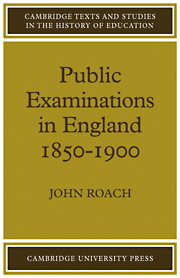Book contents
- Frontmatter
- Contents
- Dedication
- Preface
- List of abbreviations
- PART I THE COMPETITIVE PRINCIPLE ESTABLISHED
- 1 Patronage and competition
- 2 Middle-class education
- 3 Examinations and schools – to 1857
- PART II THE OXFORD AND CAMBRIDGE LOCALS AND NATIONAL EDUCATION, 1857–1900
- PART III THE PUBLIC CONTEXT, 1855–1900
- Bibliography
- Index
3 - Examinations and schools – to 1857
Published online by Cambridge University Press: 07 October 2011
- Frontmatter
- Contents
- Dedication
- Preface
- List of abbreviations
- PART I THE COMPETITIVE PRINCIPLE ESTABLISHED
- 1 Patronage and competition
- 2 Middle-class education
- 3 Examinations and schools – to 1857
- PART II THE OXFORD AND CAMBRIDGE LOCALS AND NATIONAL EDUCATION, 1857–1900
- PART III THE PUBLIC CONTEXT, 1855–1900
- Bibliography
- Index
Summary
Examinations can by their nature be nothing more than tools, the means of attaining certain objectives external to themselves. The real interest of the story, both in administrative reform and in education, is in the problem why at a particular moment of time these tools should have appeared to so many people to be a useful way of achieving certain desirable goals. The story can be comprehended only if it be related to the general background of social and administrative change in the forties and fifties, and, in the case of the schools, more particularly to the complex problems of middle-class education which were reviewed in the last chapter. The examining method was making converts very rapidly in the late forties. It appears as a subject for discussion in the school world at much the same time as the creation of new honours schools at Oxford and Cambridge, the beginning of departmental entrance examinations in the Civil Service, and the establishment of state certification for teachers in training.
The idea in its relations to the schools was carefully examined in 1847 in an interesting pamphlet by James Booth, who was at that time vice-principal of the Liverpool Collegiate Institution and an active writer on educational and mathematical subjects with a strong interest in the further education of adults.
- Type
- Chapter
- Information
- Public Examinations in England 1850–1900 , pp. 56 - 74Publisher: Cambridge University PressPrint publication year: 1971



